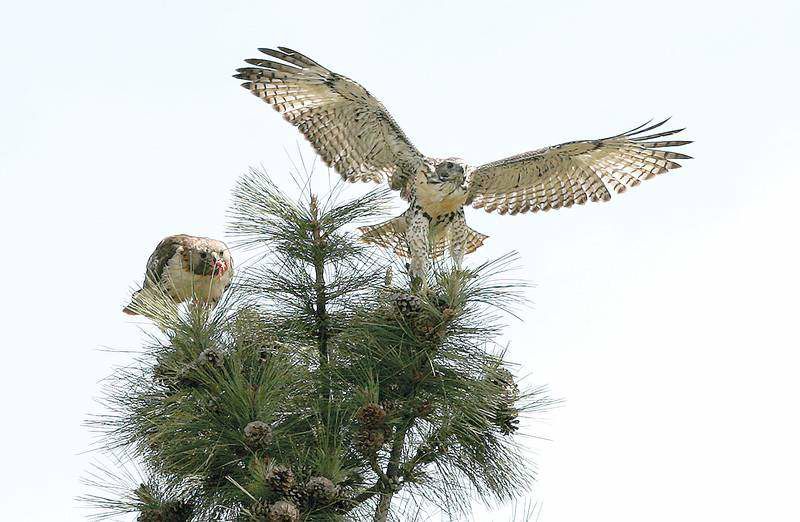Neighbors in Bend share grief of hawks
Published 5:00 am Saturday, June 21, 2008

- “Everybody loves these birds,” says Marlene Bonkosky, 70, who shares her northeast Bend neighborhood with a family of hawks.
Occasionally, if we’re lucky, we are reminded that we live but a hair’s breadth from the wild — and sometimes not that far.
Maybe it’s the glint of deer eyes in the headlights, or a news report of a cougar on the edge of town. Maybe it’s a twilight hillside limned with wildfire.
It’s the screech of the red-tailed hawk that reminds me that my space is not just my own. The hawk’s cry is the expected soundtrack to a desert romp or woodland wander, but hearing it at home, above the whine of traffic and the chaos of children, expands the boundaries of my world to include the wild space above and the creatures that inhabit it.
It’s an aural reminder that our urban world is not devoid of the forces of nature.
Turns out the hawks in my neighborhood have a more than passing association with the forces of nature. Indeed, the pair moved in this spring and built a nest in a towering ponderosa in my neighbor Marlene Bonkosky’s front yard on Northeast Revere Avenue. Bonkosky, 70, doesn’t recall the hawks previously nesting nearby in her 32 years in the neighborhood.
But this year, nest they did, and apparently three joyous eggs populated the nest shortly thereafter. Little did I know that when I watched from my backyard to see the raptors swoop and duck with a precision aeronautic engineers would admire, they were bearing fresh tidbits for the chicks in the nest. Often, one of the pair would perch on a nearby treetop and survey the block while the other tended to more domestic duties. All the while, their occasional calls would punctuate the air with a raspy kreeeea and send a shiver down the spine of any nearby rodent.
But one sunny Sunday several weeks ago, something changed. The intermittent call of the hawks became a quick-fire series of panicked, primal screams. For hours, one or both of the hawks screeched. They flew over the neighborhood in tight circles and buffeted the wind with their wings, seeming to hover over their home tree.
Something was wrong.
And when, several weeks later, another neighbor told me two chicks had fallen from the nest, I understood. Because what parent — human, avian or otherwise — wouldn’t scream in fury and grief at the loss of its offspring. Suddenly the hawks’ ceaseless shrieks became a funereal lament, and I grieved with them.
And so did the neighborhood. Bonkosky, into whose front yard the young birds fell, had worried about the babies since she noticed mama and papa hawk bringing them food weeks earlier.
“Everybody loves these birds,” she said.
Another neighbor had called Bend police to help the fallen hawks. One of the chicks died that night, but the other hawk ended up in the care of Gary Landers, a wildlife rehabilitation expert with Wild Wings Raptor Rehabilitation Center in Sisters. Landers said the hawk, a couple of months old, was in the “brancher” phase of flight development, a period when young hawks hop from branch to branch, flap their wings and try to fly very short distances.
At this stage, it’s not uncommon for a juvenile to fall from the nest, and in the wild, its parents will often continue feeding it until it’s old enough to fly on its own.
But red-tailed hawks are the most adaptable of raptors, Landers said, and many are now nesting in urban areas, where dogs, cars and people can threaten grounded birds and prevent parents from caring for them.
Landers said the fallen hawk is not physically injured, but is not behaving normally. It’s interested in live mice but is not trying to fly or hunt, as it should be at this stage. He is hopeful that the bird’s development is just delayed, and he will keep an eye on it over the next few weeks.
My neighbors are pulling for the young hawk. Landers said he has never received as many calls about hawks as he has about the Revere Avenue nest and its occupants.
Mama and papa hawk continue to patrol the neighborhood, and their remaining offspring has fledged — the chick first flew Wednesday, Bonkosky said. The juvenile hawk — now almost as large as its parents — has been spotted perching in nearby treetops and sharing meals with a parent.
And as I watch the birds wheel and soar above their urban landscape, I listen to their calls and am reminded how lucky I am — how lucky all of us are — to live in a world where the beauty of our landscape and the creatures with whom we share it is brought home with the lovely screech of a wild raptor.






